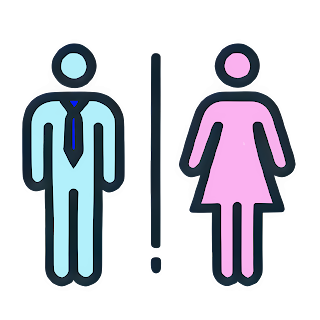Korean Toilet Culture Guide for Foreign Travelers – Useful Tips!
 |
| Toilet pastel tone symbol |
1. Public Toilets Are Free & Easy to Find
One of the best things about public restrooms in Korea is that they’re free! You can easily find them in subway stations, parks, shopping malls, and major tourist attractions. Many of them are well-maintained, and in large cities like Seoul, you’ll even find English signage to help guide you.
2. Toilets & Bidet Features
A unique feature of Korean restrooms is the widespread use of bidets. In upscale restaurants, hotels, and cafes, you’ll often find toilets equipped with heated seats, adjustable water pressure, and even air-dry functions! However, in rural areas or older buildings, you may still come across traditional squat toilets, so be prepared for both.
3. Toilet Paper Usage & Disposal
Most public restrooms in Korea provide toilet paper, and it’s standard practice to flush it down the toilet. However, in older facilities, you might see signs instructing you to dispose of used paper in a trash bin instead. Always check the signs to avoid any issues.
4. Hand Sanitizer Instead of Soap
Many public restrooms in Korea provide liquid soap or hand sanitizer rather than bar soap. However, some places may not have any soap available, so it’s a good idea to carry a small hand sanitizer or wet wipes while traveling.
5. Pay Attention to Gender Signs
Korean restroom signs usually display ‘Men’ and ‘Women’ in either Korean or universal icons. The color coding is often blue for men and red for women. Some signs may be a bit tricky to interpret, so take an extra moment to ensure you’re entering the right restroom.
6. Female Cleaners in Men’s Restrooms
Don’t be surprised if you see female cleaning staff inside men’s restrooms. In Korea, it’s quite common for female janitors to clean both men’s and women’s facilities. They usually post a sign to inform users, and you’re still allowed to use the restroom while cleaning is in progress.
7. High-Tech & Unmanned Restrooms
In some cities, you might come across unmanned smart restrooms. These high-tech facilities feature digital displays showing availability, automatic cleaning systems, and temperature control functions—offering a glimpse into Korea’s advanced technology.
8. Diaper Changing Stations & Accessible Toilets
Most large public facilities offer diaper-changing stations, and accessible toilets for disabled individuals are becoming more widespread. This makes traveling in Korea much more convenient for those with mobility challenges or small children.
Final Tips
Korea’s restrooms are among the cleanest and most user-friendly in the world. While cultural differences may take some getting used to, knowing these restroom tips in advance will ensure a hassle-free experience.
So, as you plan your adventure in Korea, remember these small but useful toilet culture tips—they’ll make your trip even more comfortable! 😊





